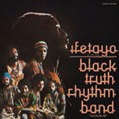Ifetayo
Author: Robin Denselow
View album and artist detailsAlbum and Artist Details
Artist/band: |
Black Truth Rhythm Band |
Label: |
Soundway Records |
Magazine Review Date: |
June/2012 |
Soundway Records have an impressive catalogue of rare groove reissues, many of them from Africa. But although there are African influences on this intriguing album, it was actually recorded in Trinidad back in 1975. Ifetayo was the only release from Black Truth Rhythm Band, an outfit led by singer and multi-instrumentalist Oluko Imo, who defied trends in Caribbean music at the time by not imitating US funk and soul artists, or playing local calypso, but mixing African influences into his songs – even though he found it hard to get hold of many African records in the West Indies. He was such a fan of African styles that he would later work with Fela Kuti and perform with members of Fela's Egypt 80 band.
Imo dominates this album. He's the lead singer and also plays bass, congas, flute and kalimba thumb piano. He sets the mood with the title-track, a six-minute workout in which African chanting is matched against languid and insistent funk keyboards, wailing guitar and lengthy percussion. It's not exactly dance music, for the approach is unexpectedly slow but edgy, like a West Indian treatment of African psychedelic funk. Other tracks continue this same distinctive approach, while introducing different influences. ‘You People’ mixes slow, shuffling funk with echoes of soul balladry, while ‘Save D Musician’ has a lighter, jazzier feel. Then comes ‘Kilimanjaro’, mixing clanking percussion with more slow and rumbling funk influences, wailing guitar work and solid, insistent percussion.
None of this sounds distinctively Caribbean, but there is at least an echo of calypso on the song ‘Aspire’ – though it's mixed in with a ponderous bass line, insistent percussion and easy, drifting guitar work. The set ends with the best and longest track, ‘Umbala’, which starts out as a rumbling, funky shuffle mixed with more chanting vocals, and builds up into a lengthy blend of percussion, kalimba and chanting. It's little surprise that the band became popular on the Trinidad music scene back in the 1970s. A bravely experimental fusion set.

